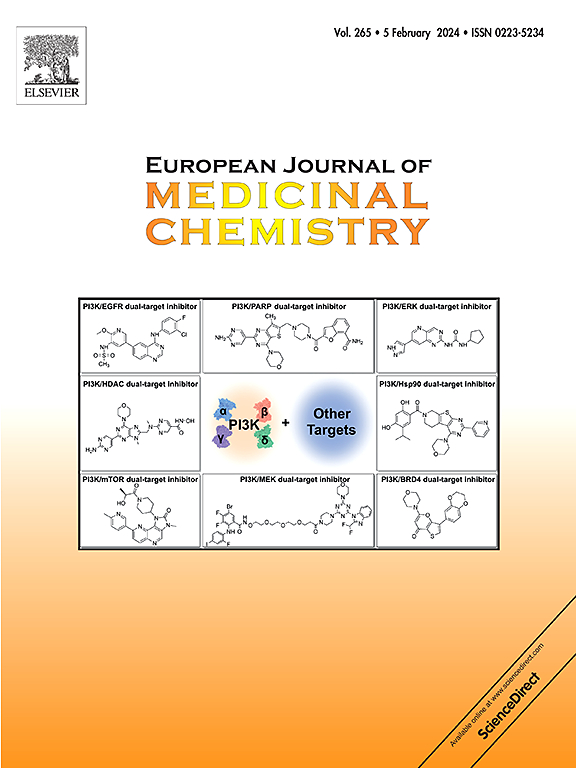作为C9orf72 G4C2延伸重复序列RNA结合物的芳基双鸟酰腙的设计、合成和表征
IF 6
2区 医学
Q1 CHEMISTRY, MEDICINAL
引用次数: 0
摘要
源自C9orf72基因突变的G4C2重复扩增是肌萎缩性侧索硬化症(ALS)和额颞叶痴呆(FTD)患者的致病因素,可导致多种病理事件。据报道,双噻吩对二尼科咪胺2a在亚微摩尔浓度下优先稳定g -四联体G4C2 RNA结构。我们用符合bbb的鸟酰腙取代了它的脒基,并进行了支架变化以提高水溶性。以双噻吩- (4b-6a)、双恶唑- (7b)、二苯脲二胺- (8b)和苯基二氧基二氮杂苯基为支架(9a,b)构建了一个八元阵列。该阵列的生物学分析鉴定出4b是一种有前途的药物样命中,在ALS患者来源细胞的细胞分析中具有活性。本文章由计算机程序翻译,如有差异,请以英文原文为准。


Design, synthesis and characterization of aryl bis-guanyl hydrazones as RNA binders of C9orf72 G4C2 extended repeats
Expanded G4C2 repeats derived from mutations of the C9orf72 gene are causative factors in amyotrophic lateral sclerosis (ALS) and frontotemporal dementia (FTD) patients, leading to multiple pathological events. Bis thiophene para dinicotinimidamide 2a was reported to preferentially stabilize G-quadruplex G4C2 RNA structures at sub-micromolar concentrations. We replaced its amidine groups with BBB-compliant guanyl hydrazones, and carried out scaffold variations to improve water solubility. An eight-membered array was built around bis-thiophene- (4b-6a), bis-oxazole- (7b), diphenylurea diamide- (8b) and phenyldioxy ditriazolephenyl scaffolds (9a,b). Biological profiling of the array identified 4b as a promising, drug-like hit, active in cellular assays on ALS patient-derived cells.
求助全文
通过发布文献求助,成功后即可免费获取论文全文。
去求助
来源期刊
CiteScore
11.70
自引率
9.00%
发文量
863
审稿时长
29 days
期刊介绍:
The European Journal of Medicinal Chemistry is a global journal that publishes studies on all aspects of medicinal chemistry. It provides a medium for publication of original papers and also welcomes critical review papers.
A typical paper would report on the organic synthesis, characterization and pharmacological evaluation of compounds. Other topics of interest are drug design, QSAR, molecular modeling, drug-receptor interactions, molecular aspects of drug metabolism, prodrug synthesis and drug targeting. The journal expects manuscripts to present the rational for a study, provide insight into the design of compounds or understanding of mechanism, or clarify the targets.

 求助内容:
求助内容: 应助结果提醒方式:
应助结果提醒方式:


